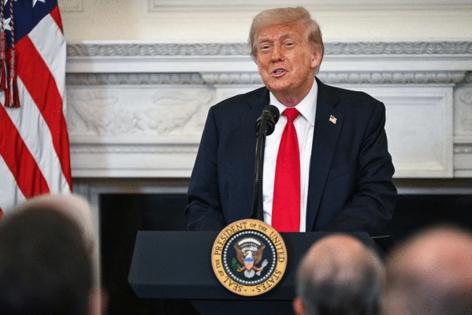Trump is said to ask Zelenskyy If Ukraine can strike Moscow
Published in News & Features
Donald Trump asked Volodymyr Zelenskyy whether Ukraine could strike Moscow, an inquiry that the White House says was merely a question but one that came hours after he voiced frustration at Russian President Vladimir Putin’s refusal to accept a ceasefire in the war.
During a July 4 phone call with the Ukrainian president, Trump quizzed Zelenskyy about whether Ukraine could hit the Russian capital and St. Petersburg if given U.S. long-range weapons, according to a person briefed about the conversation. Zelenskyy replied that it could if the U.S. provided the weapons, the person said.
Asked about the details of the call, which were first reported by The Financial Times, White House Press Secretary Karoline Leavitt said: “President Trump was merely asking a question, not encouraging further killing. He’s working tirelessly to stop the killing and end this war.”
The conversation took place a day after Trump said he was “very disappointed” by a phone call with Putin, in which the Russian leader insisted he wouldn’t back down on his war aims.
Ukraine has successfully targeted Moscow with drones in the past, but the long-range missiles provided by its western allies so far have lacked the capabilities to reach the city.
Details of the discussion emerged a day after Trump pledged fresh weapons supplies to Kyiv that would be paid for by NATO allies, mainly from Europe, and threatened harsh financial penalties targeting Russian oil sales if Putin doesn’t end the war on Ukraine within 50 days.
Oil declined for a second day as traders doubted Trump’s plan would pose a meaningful obstacle to Moscow’s energy exports. Global benchmark Brent fell beneath $69 a barrel after losing 1.6% on Monday.
Kremlin spokesman Dmitry Peskov on Tuesday said Trump’s public comments were “serious” and Russia needed time to analyze them, according to the Interfax news service. “Any attempts to make demands — especially ultimatums — are unacceptable for us,” Russian Deputy Foreign Minister Sergei Ryabkov also said Tuesday, the state-run Tass news service reported.
Trump’s move to raise pressure on Putin came after months of unsuccessful diplomacy aimed at persuading Russia to halt its war on Ukraine and negotiate a peace deal. Instead, Russia has intensified its drone and missile attacks on Ukrainian cities in recent weeks.
Trump told the BBC in an interview Monday that he was “disappointed” in Putin, but not “done with him.”
The U.S. president didn’t explain how the proposed “secondary tariffs” would work, but he has used the term in the past to describe duties imposed on countries for trading with American adversaries. The threats echo punishment spelled out in a bipartisan bill in Congress that would impose 500% tariffs on countries that buy Russian oil and gas such as China and India.
“We’re going to be doing very severe tariffs if we don’t have a deal in 50 days, tariffs at about 100%,” Trump said during a meeting with North Atlantic Treaty Organization Secretary General Mark Rutte at the White House on Monday.
Matt Whitaker, the U.S. ambassador to NATO, said the planned action effectively represents secondary sanctions on countries buying oil from Russia. “It’s about tariffs on countries like India and China that are buying their oil,” he told reporters. “And it really is going to, I think, dramatically impact the Russian economy.”
China criticized the U.S. effort to pressure Beijing over its energy ties with Moscow. Chinese President Xi Jinping called for deeper engagement with Russia in a meeting with Russian Foreign Minister Sergei Lavrov on Tuesday in Beijing. Chinese Foreign Ministry spokesman Lin Jian said his country opposes “long-arm jurisdiction.”
Top-of-the-line
The comments mark the latest signal of Trump’s growing impatience with Putin’s refusal to end Moscow’s war in Ukraine, which has dragged on since 2022. Yet, the arrangement risks Moscow continuing its barrage on the battlefield for weeks before it considers returning to talks.
Putin has insisted he wants iron-clad assurances on resolving what he calls the root causes of the conflict, including by ending Ukraine’s NATO ambitions and Western military support.
Much of the defense materiel Kyiv will receive will depend on Europe’s ability and willingness to make the purchases. Ukraine needs air-defense systems and drone interceptors as well as a constant supply of artillery shells and missiles.
Trump said the U.S. was sending a “top-of-the-line weapons” package that includes Patriot air-defense batteries. “We’re not buying it, but we will manufacture it,” Trump said.
Zelenskyy said Monday in a post on X that he’d spoken with Trump, who briefed him on his discussions with Rutte. “We agreed to catch up more often by phone and coordinate our steps in the future as well,” he posted.
German Chancellor Friedrich Merz welcomed Trump’s announcement, adding that he “assured him: Germany will decisively contribute.” Merz’s government has suspended debt restrictions on defense spending both for the German army and military aid for Ukraine. Berlin is looking to finance the purchase of two Patriot batteries for Kyiv.
Trump hailed Monday’s announcement as a major shift in course, but the details of the decision also reflect Trump’s priorities: It won’t cost the U.S. anything and Trump is not dedicating any new U.S. funding to Ukraine, at least for now.
The NATO chief said the bloc would coordinate among allies to fulfill Ukraine’s military needs including air defense equipment, missiles and ammunition. Germany will play a major part, alongside Finland, Denmark, Sweden, Norway, The Netherlands and Canada, according to Rutte.
“This is again Europeans stepping up,” Rutte said, adding that Putin should “take negotiations about Ukraine more seriously.”
©2025 Bloomberg L.P. Visit bloomberg.com. Distributed by Tribune Content Agency, LLC.







Comments